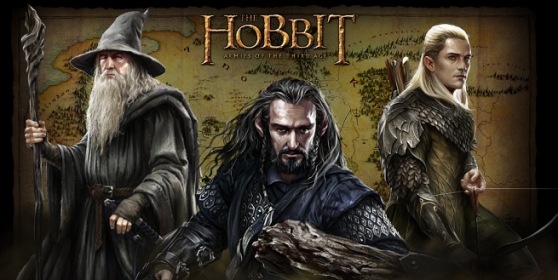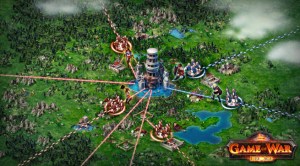Schiermeyer: That’s a powerful motivation. I’ve seen Fire Age execute all that flawlessly. They have this one mechanic I’ve witnessed in the game. If you buy anything in the game, everyone in the alliance gets a gift. The alliance chat just erupts with thank-yous and telling people what their gift was. There’s all this social currency being traded between each other. It’s a very emotional moment, especially if you’re the guy who dropped 100 bucks and everyone’s like, “Wow, a gift! You’re awesome!”
What happens, I’ve noticed, is that one person will start it, and then four or five other people will follow within 10 minutes. I’ve seen this happen maybe 10 or 15 times now. A lot of people have some disbelief around paying money in games, a mental barrier. When you see other people break that down, it makes it easier for you to break it down.
GamesBeat: Gifting in dating apps has been very lucrative. Bringing that into games–
Schiermeyer: I used to spend five hours a day farming in World of Warcraft to give away potions on raids. Why did I want to do that? I don’t know if we’re going to put that in the first version of the game, but we have a bunch of follow-up ideas.
GamesBeat: You’re talking about a bunch of things that are powerful monetization techniques. I go back and think, why haven’t other people figured it out? There are still so many failures in mobile games. You don’t see anybody crack the top-grossing list so much. I was talking with Gabe Leydon at Machine Zone about this. The top five have all been there for a year or two.
Schiermeyer: I don’t know yet. I’m going to try. That’s my goal. My personal goal is to own all five slots. I don’t know if I can do that, but I like to set big goals for myself.
GamesBeat: I look at EA, with 900 games, and they’re only talking about a couple of them that are proud of, that are monetizing, like The Simpsons: Tapped Out. It still seems very hard to do.
Schiermeyer: I was reading up on Machine Zone, what they were doing. It’s clear to me that Machine Zone’s success is through the alliance system. The game’s a spreadsheet. You’re pretending this spreadsheet you’re looking at is a fun game experience. It’s not actually a game, not in the sense that anyone who grew up playing games would consider.
GamesBeat: It’s a little more real-time than the Kabam games, at least, which are very spreadsheet-like.
Schiermeyer: You see something moving across the screen. There could be a bit of a game to that. You scout me, I scout you back, that kind of thing. But the real magic of it is in the alliance system and the revenge monetization.
GamesBeat: There’s a lot of sophistication to the communication system they have.
Schiermeyer: Definitely. But back to your earlier question, why haven’t more people done it? I feel like a lot of people lack the ability to create a game as a service. People have a lot of ideas. If you can’t iterate on those ideas, or don’t at least start with some level of understanding of what you’re going to have to do to keep people retained, you’re going to have, at best, these games that suddenly explode and fade away. Like Dots or Flappy Bird. There’s more discipline involved.
GamesBeat: You were saying you’d try to keep the company small. It seems like there’s more pressure to build up a larger and larger company that continues these services and creates new games.
Schiermeyer: Let’s try and dissect that pressure a little bit. Where’s that pressure coming from? Who wants to have a large organization? You need a large organization if you want to have multiple titles. If those multiple titles are services being managed, you’re going to need people to manage them. But why exactly do you want that?
GamesBeat: Better 3D art?
Schiermeyer: You can outsource your 3D art. My belief right now, what I think I’m perceiving, is that if you raise money, or you promise people that your company’s going to be worth something someday in the future, you have to fulfill that promise to your investors and to your employees. Suddenly one game making a million dollars a day isn’t enough. But it sure feels like it’s enough to me. I don’t need more than that. I don’t need a billion dollars.
I would like to make a billion dollars. I’m not going to limit myself as far as how much I can make. But I’m not going to create a convoluted structure that forces me into this position where I have to have 3,500 employees running around with their heads cut off, not aligned, not focused on creating sustainable value, if I don’t have to. I don’t believe I do. I feel it’s both intuitively and rationally obvious that I can do quite well – way better than the average – with a small team. I don’t have to hire a CFO. I don’t have to have a 50-person human resources department.
GamesBeat: There’s probably also enough services around you to handle things if you need advertising or technology–
Schiermeyer: Yeah. You have experts in that field you can outsource to. Even things like your backend. Let them deal with scaling my infrastructure. I don’t want to deal with that. I don’t want to hire a bunch of very expensive employees and promise them that they’re all going to be millionaires. I want a group of ninjas who are going to take down the top grossing. That’s what I want them to focus on. I don’t want someone coming in and talking to me about the intricacies of managing remote QA. I just don’t want to have to care about that stuff.
I had multiple conversations with people at Zynga who were complaining to me about the inordinate expense of the way that we were managing QA. I’m sitting in these meetings and thinking, “Why am I having this conversation at all? What went wrong with our company that this is how I spend my time?”
GamesBeat: That structure you mentioned, are you extremely focused on that structure, or do you have some other things like—If someone really wants stock options, can you give it to them? If someone wants to put money into the company or somesuch?
Schiermeyer: We have a pool for investors. Right now we have three investors – myself, David, and Marco. If someone wants to be in that pool, they have to put up money. But we’ve made that pool very small relative to the number of employees. If you really have to own a piece of Luminary, you can. You just have to pay for it.
GamesBeat: Has anyone else done something like this, that you know of?
Schiermeyer: I remember someone telling me about a game company where—I forget the name. They had a profit-sharing program. The CEO comes in, everyone’s in the conference room, he goes up to the board and starts writing zeroes. He ends up writing like 75,000 and he tells them, “That’s what everyone’s getting.” The room erupts and they’re all freaking out. He does that every quarter or something. That’s cool. I want to add another zero to it.
 GamesBeat: It sounds like you’re having fun.
GamesBeat: It sounds like you’re having fun.
Schiermeyer: Yeah. We’re not going to kill ourselves to accomplish this goal. None of us really want to crunch. It’s been my experience, too, that crunching doesn’t lead to success. I’ve seen so many people come in to a company looking vibrant, healthy, fit, and they gradually become pale, weak, ill all the time. And for what? By the time they’re in that dilapidated state, what are they actually providing? They’re sick half the time. Their work isn’t very good. Eventually they quit, or someone comes up with a brilliant idea to fire them because they’re underperforming. Whose fault is that, really? Is it their fault for agreeing to work 120 hours a week? Or was it our fault for asking them to work 120 hours a week?
GamesBeat: Just setting up the wrong incentive.
Schiermeyer: Exactly. We value face time. Which is just absurd. So none of that. That’s useless. It doesn’t provide value.
GamesBeat: It all sounds a little un-Silicon Valley.
Schiermeyer: Yeah, it is. I mean, my first startup that was really successful was Intermix Media. Remember those guys? MySpace? I started MySpace with a bunch of guys down in L.A. We were very un-Silicon Valley down there. We actually cared about revenue back then, in 2000, when everyone was like, “You don’t need revenue! Revenue is passé!” We did, and we survived, although MySpace could have been better.
Later on, when Zynga started getting bad press, people were coming to me to talk shit about Mark, and I didn’t do it. Not because Mark didn’t have his own self-admitted flaws, as we saw in the last couple of days, but because Mark’s a good guy. He’s a better friend to have than a business partner. But he’s not a bad person at all.
GamesBeat: Facebook has Oculus now. They almost seem to be coming to the other side of the pendulum, saying that the hardcore gaming executives are the ones who should run the place. I don’t know if that’s the right answer either.
Schiermeyer: My belief is that you need both. You need to be a balanced human being to succeed in the long run, in any endeavor. One of the things I played around with when I left Zynga, I was talking a lot to the guy who started the Wisdom 2.0 conference. While I was at Zynga, I started up pretty much all the perks – the food, yoga, acupuncture, massage. These were all things I started there. I brought in people to do qigong and meditation. All in the hopes of bringing some balance to the organization. It was kind of out of balance, all these people working so hard.
I think there’s a way for us to generate income and create value, and at the same time create well-being and a healthy life within these organizations. I categorically reject the Silicon Valley belief that you have to work yourself to the bone to be successful. In line with that, 100 percent, I disagree with the belief that you have to have a narcissistic CEO. I can’t tell you how many times somebody’s told me, “He’s not a narcissist. He’s not gonna be a good CEO. They’re not working themselves to the bone. It’s not gonna be successful.” Total bullshit. It’s a complete lie. The only reason someone might believe that is because they haven’t done it themselves, or they’ve only done it once.
I think everyone’s secret fear, when they’ve only been successful once, is that when they try again, they’ll be proven a fraud. Like if my company fails.
GamesBeat: Is there anything in particular that got you off the couch and made you want to do this? To do something better than you’d done before, or something different?
Schiermeyer: When I left Zynga, I ended up leaving because I was too frustrated by internal politics to keep expending my energy and achieving results that didn’t satisfy me. Being accustomed to the organization moving when I wanted it to move—That left me frustrated when it wouldn’t.
There were a lot of unanswered questions for me. One of them was this discipline I started. I watch these conferences now that talk about a lot of these things we got going at Zynga. I feel a bit disappointed in where it is, the level of the discourse.
GamesBeat: There are so many analytics companies, but they’re not–
Schiermeyer: –analyzing anything? I feel like there are so many analytics companies providing you analytics that don’t tell you anything about what’s really going on. I’m saying that flippantly, but I’m talking about things at a higher level. That’s one of the big ones. I believe strongly that we could have done Zynga without so much—What did they used to call it? Zynga speed? Zynga time? Really what that meant was that we worked 12 hours a day.
My big thing – and I was trying to propose this at Zynga – was that if we just had better kung fu, we would be more successful. We wouldn’t have to run around with our heads chopped off, praying that someone in this huge organization would do something right.
We talk about how we think of ourselves kind of like a band. We all have something creative to express right now. I think that’s one of the reasons why I do this. I want to express something creatively.
VentureBeat's mission is to be a digital town square for technical decision-makers to gain knowledge about transformative enterprise technology and transact. Learn More





